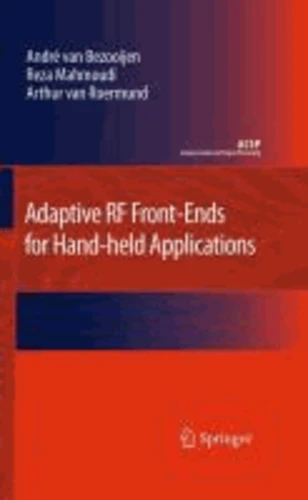Adaptive RF Front-Ends for Hand-held Applications
Par : , ,Formats :
- Paiement en ligne :
- Livraison à domicile ou en point Mondial Relay indisponible
- Retrait Click and Collect en magasin gratuit
- PrésentationCartonné
- Poids0.407 kg
- Dimensions15,5 cm × 24,0 cm × 2,0 cm
- ISBN978-90-481-9934-1
- EAN9789048199341
- Date de parution01/12/2010
- CollectionAnalog Circuits and Signal Pro
- ÉditeurSpringer
Résumé
The RF front-end - antenna combination is a vital part of a mobile phone because its performance is very relevant to the link quality between hand-set and cellular network base-stations. The RF front-end performance suffers from changes in operating environment, like hand-effects, that are often unpredictable. Adaptive RF Front-Ends for Hand-Held Applications presents an analysis on the impact of fluctuating environmental parameters.
In order to overcome undesired behavior two different adaptive control methods are treated that make RF frond-ends more resilient: adaptive impedance control, and adaptive power control. Several adaptive impedance control techniques are discussed, using a priori knowledge on matching network properties, in order to simplify robust 2-dimensional control.A generic protection concept is presented, based on adaptive power control, which improves the ruggedness of a power amplifier or preserves its linearity under extremes.
It comprises over-voltage, over-temperature, and under-voltage protection.
In order to overcome undesired behavior two different adaptive control methods are treated that make RF frond-ends more resilient: adaptive impedance control, and adaptive power control. Several adaptive impedance control techniques are discussed, using a priori knowledge on matching network properties, in order to simplify robust 2-dimensional control.A generic protection concept is presented, based on adaptive power control, which improves the ruggedness of a power amplifier or preserves its linearity under extremes.
It comprises over-voltage, over-temperature, and under-voltage protection.
The RF front-end - antenna combination is a vital part of a mobile phone because its performance is very relevant to the link quality between hand-set and cellular network base-stations. The RF front-end performance suffers from changes in operating environment, like hand-effects, that are often unpredictable. Adaptive RF Front-Ends for Hand-Held Applications presents an analysis on the impact of fluctuating environmental parameters.
In order to overcome undesired behavior two different adaptive control methods are treated that make RF frond-ends more resilient: adaptive impedance control, and adaptive power control. Several adaptive impedance control techniques are discussed, using a priori knowledge on matching network properties, in order to simplify robust 2-dimensional control.A generic protection concept is presented, based on adaptive power control, which improves the ruggedness of a power amplifier or preserves its linearity under extremes.
It comprises over-voltage, over-temperature, and under-voltage protection.
In order to overcome undesired behavior two different adaptive control methods are treated that make RF frond-ends more resilient: adaptive impedance control, and adaptive power control. Several adaptive impedance control techniques are discussed, using a priori knowledge on matching network properties, in order to simplify robust 2-dimensional control.A generic protection concept is presented, based on adaptive power control, which improves the ruggedness of a power amplifier or preserves its linearity under extremes.
It comprises over-voltage, over-temperature, and under-voltage protection.

